- Home
- Dave Eggers
What is the What Page 6
What is the What Read online
Page 6
As I lie here, I realize that the tape over my mouth is loosening. The saliva from my mouth and the perspiration on my face has softened the tape’s grip. I begin to accelerate the process, exercising my lips and spreading saliva liberally. The tape continues to break away from my skin. You, TV boy, see none of this. You seem unaware that there is a bound and gagged man on the floor, and that you are watching television in this man’s home. But we adapt, all of us, to the most absurd situations.
I know everything one can know about the wasting of youth, about the ways boys can be used. Of those boys with whom I walked, about half became soldiers eventually. And were they all willing? Only a few. They were twelve, thirteen years old, little more, when they were conscripted. We were all used, in different ways. We were used for war, we were used to garner food and the sympathy of the humanitarian-aid organizations. Even when we were going to school, we were being used. It has happened before and has happened in Uganda, in Sierra Leone. Rebels use refugees to attract aid, to create the appearance that what is happening is as simple as twenty thousand lost souls seeking food and shelter while a war plays out at home. But just a few miles away from our civilian camp, the SPLA had their own base, where they trained and planned, and there was a steady pipeline of supplies and recruits that traveled between the two camps. Aid bait, we were sometimes called. Twenty thousand unaccompanied boys in the middle of the desert: it is not difficult to see the appeal to the UN, to Save the Children and the Lutheran World Federation. But while the humanitarian world fed us, the Sudan People’s Liberation Army, the rebels who fought for the Dinka, were tracking each of us, waiting until we were ripe. They would take those who were old enough, those who were strong and fit and angry enough. These boys would trek over the hill to Bonga, the training camp, and that was the last we would see of them.
I almost cannot believe myself, but at this moment, I am contemplating ways that I might save you, TV Boy. I am envisioning freeing myself, and then freeing you. I could wriggle my way out of my bindings, and then convince you that being with me will serve you better than remaining with Tonya and Powder. I could sneak away with you, and we could leave Atlanta together, both of us looking for a different place. I have an idea that things might be good in Salt Lake City, or San Jose. Or perhaps we need to be away from these cities, any city. I think I am finished with cities, TV Boy, but wherever we go, I have an idea that I could take care of you. It was not so long ago that I was like you.
But first we have to leave Atlanta. You need to move far away from these people who have put you in this situation, and I need to leave what has become an untenable climate.
Things here are too tense, too political. There are eight hundred Sudanese in Atlanta, but there is no harmony. There are seven Sudanese churches, and they are being pitted against each other constantly and with increasing rancor. The Sudanese here have regressed to tribalism, to the same ethnic divisions we gave up long ago. In Ethiopia there were no Nuer, no Dinka, no Fur or Nubians. We were, in many cases, too young to know what these distinctions meant, but even if we were aware, we had been taught and had agreed to set aside our supposed differences. We were all in Ethiopia alone, and had seen hundreds of our own die en route to a place only marginally better than what we’d left.
Almost from the moment we arrived here, it was impossible to return to life in Sudan. I have not been to Khartoum, so I cannot speak for the style of life there. I hear there is some semblance of modernity. But in southern Sudan, we are by any estimation at least a few hundred years behind the industrialized world. Some sociologists, liberal ones, might take issue with the notion that one society is behind another, that there is a first world, a third. But southern Sudan is not of any of these worlds. Sudan is something else, and I cannot find apt comparison. There are few cars in southern Sudan. You can travel hundreds of miles without seeing a vehicle of any kind. There are only a handful of paved roads; I saw none while I lived there. One could fly a straight east-west line across the country and never pass over a home built of anything but grass and dirt. It is a primitive land, and I say that without any sense of shame. I suspect that within the next ten years, if the peace holds, the region will make the sort of progress that might bring us to the standards of other East African nations. I do not know anyone who wishes southern Sudan to remain the way it is. All are ready for what comes next. There are SPLA tanks parading through Juba, the capital of the south. There is pride there now, and all the doubts we’ve had about the SPLA, and all the suffering they caused, have been largely forgiven. If the south achieves freedom it is through their work, however muddled.
I realize that my mouth is soaked and the tape is no longer firmly attached. I blow, and to my surprise, the left half of the tape flaps away. I can speak if I want to speak.
‘Excuse me,’ I say. My voice is soft, much too quiet. There is no indication he hears me. ‘Young man,’ I say, now in a normal volume. I don’t want to startle him.
I get no reaction.
‘Young man,’ I say, now louder.
He turns briefly to me, disbelieving, as if he noticed the couch itself talking. He returns to the television.
‘Young man, can I speak with you?’ I say, louder now, firmer.
He whimpers and stands up, terrified. My only guess is that they told him that I was African, and in his mind he did not think that classification entailed the ability to speak, much less speak English. He takes two steps toward me, stopping in the entranceway to the living room. He is still not sure I will speak again.
‘Young man, I need to talk to you. I can help you.’
This sends him back to the kitchen, where he takes the cell phone, pushes a button, and brings the phone to his ear. He listens but does not get the desired recipient. He has, I am assuming, been told to call his accomplices if I wake up or anything is amiss, and now that I have, they are not answering. He gives his predicament some thought and finally settles on a solution: he sits again and turns up the volume on the television.
‘Please!’ I yell.
He leaps in his seat.
‘Boy! You must listen to me!’
Now he searches for a solution. He begins to open drawers. I hear the rattle of silverware and worry that he might do something drastic. He opens five, six drawers and cabinets. Finally he emerges from the kitchen with a phone book. He carries it over to me and holds it over my head.
‘Young man! What are you doing?’
He drops the book. It is the first time in my life that I have seen something coming toward me and have been unable to properly react. I try to turn my head but still the book lands squarely on my face. The pain is compounded by my existing headache and the ricochet my chin makes against the floor. The phone book slides off, toward my forehead, and rests there, against my temple. Thinking he has accomplished his goal, he returns to the kitchen and the volume goes up again. This boy thinks I am not of his species, that I am some other kind of creature, one that can be crushed under the weight of a phone book.
The pain is not great, but the symbolism is disagreeable.
CHAPTER 6
I open my eyes, having stumbled into sleep for minutes or hours. The boy is asleep on the couch above me. He has taken his towels-for-blankets and has arranged himself on the end of the couch, his feet neatly stuffed into the cushions. And now he is whimpering. He is having a nightmare, his face contorted like a toddler’s, his petulant frown robbing him of years. But I am less sympathetic now.
There are no clocks visible, though it feels like the middle of the night. There are no traffic sounds outside. It could be midnight or later.
Achor Achor, I don’t want to curse you but this situation would be much different if you saw fit to come home. I like and admire Michelle, and I am proud of you for having found an American who loves you, but at the moment I think your behavior is irresponsible. At the same time, I wonder how the burglars knew that you would be gone, that they could be sure about leaving their son, their sibling, her
e. It is hard to understand. They are either brilliant or simply reckless.
I wonder what images are troubling you, TV Boy. I am torn—I could talk to you again, waking you from the troubles, or I could relish, in a small way, that the boy who thinks he can crush an African man with a phone book is now suffering night tremors. It does not seem so cruel to let you whimper on the couch, TV Boy. After all, if I were to speak again, what would you drop on me next? I have an unabridged dictionary in my room, and I do not doubt you would use it.
A phone rings, not mine. My phone is gone. The ringtone is that of a popular song I cannot place. My grasp of American popular music is tenuous, I suppose, even after five years and after most of my friends have embraced it vigorously.
Get up, TV Boy, and answer your phone!
The rings continue. The caller might want to tell you to free me; the caller could be the police. Rouse yourself, boy!
Three rings and there is no sign he will awaken. I have to influence these events. At the risk of bringing more objects onto my head, I make as loud a noise as I can. My desperation brings my voice into the higher register; I produce a loud shriek that makes the boy virtually leap off the couch. The phone rings again and this time he picks it up.
‘What?’ he says. ‘This is Michael.’
The voice coming through the phone is a man’s, resonant and slow.
‘She’s not here.’
A question.
‘I don’t know. She told me she’d be here by now.’
The boy is nodding.
‘All right.’
‘All right.’
‘Bye.’
So, it is Michael. Michael, I am happy to know your name. It is a name with less menace than TV Boy, and further convinces me that you are a victim of those charged with protecting you. Michael is the name of a saint. Michael is the name of a boy who wants to be a boy. Michael was the name of the man who brought the war to Marial Bai. It is natural to assume that a war like ours came one day, the crack of thunder and then war, falling hard like rain. But first, Michael, there was a darkening sky.
Now, perhaps, your mood has turned for the worse. You’ve been here too long, in this apartment, and what seemed like an adventure is now tedious, even frightening. I am not as innocuous as you first thought, and I’m sure you’re dreading the possibility that I might speak again. For now I have nothing to say, not out loud, but you should know about the Michael who in 1983 brought the first portents of war to our village.
William K woke me up, whispering on the other side of the hut wall.—Get up get up get up! he hissed.—Get up and see this.
I had no inclination to follow William K, given that on so many occasions I had been asked to run to this place or that place or climb that tree, only to see some hole dug by a dog, or a nut that resembled the face of William’s father. Always the sights were greater in the mind of William K and seldom were they worth the trouble. But as William K whispered through my door, I heard the raised voices of an excited crowd.
—Come! William K urged.—I swear this is something!
I got up, dressed myself, and ran with William K to the mosque, where a curious crowd had gathered. After we crawled through the legs of the adults gathered around the mosque’s door, we raised ourselves to our knees and saw the man. He was sitting on a chair, one of the sturdy wood-and-rope chairs that Gorial Bol made and sold in the market and over the river. The sitting man was young, the age of my brother Garang, just old enough to be married and in his own home and with his own cattle. This man had ritual scars on his forehead, which meant he was not from our town. In other regions and other villages, the men, at thirteen years old or so, are given scars across their foreheads upon their entry into manhood.
But this man, whose name we learned was Michael Luol, was missing a hand. Where his right hand should have been, his wrist led nowhere. The crowd, mostly men, were inspecting the missing hand of the young man, and there were many opinions about who was to blame. William and I remained on our knees, where we could be close to the missing hand, waiting to hear how this had happened.
—But they have no right to do this! a man roared.
There were three men central to the argument: Marial Bai’s chief, a bull of a man with wide-set eyes, his lean and laconic deputy, and a rotund man whose stomach burst through his shirt and pushed against my back each time he made a point.
—He was caught stealing. He was punished.
—It’s an outrage! This is not Sudanese justice. The handless man sat silently.
—It is now. That’s the point. This is sharia.
—We can’t live under sharia!
—We’re not living under sharia. This was in Khartoum. You go to Khartoum, you live under their law. What were you doing in Khartoum, Michael?
The men soon placed the blame squarely on the shoulders of the handless man, for had he stayed in his own village and kept from thieving, he would still have his right hand and might have a wife, too—for it was generally agreed that he would never have a wife now, no matter what dowry he could offer, and that no woman should be required to have a husband with a missing hand. Michael Luol received little sympathy that day.
After leaving the mosque, I asked William K what had happened to the man. I had heard the word sharia, and some derogatory remarks about the Arabs and Islam, but no one had clearly related the events that had led to Michael Luol’s hand being removed. As we walked to the great acacia to find Moses, William K related the story.
—He went to Khartoum two years ago. He went as a student, and then ran out of money. Then he was working as a bricklayer. Working for an Arab man. A very rich man. He was living with eleven other Dinka men. They lived in an apartment in a poor part of the city. This is where the Dinka lived, Michael Luol said.
This seemed odd to me, that the Dinka would live anywhere considered poor, while the Arabs lived well. I tell you, Michael of the TV, that the pride of the mony-jang, the men among men, was very strong. I have read anthropologists who were amazed at the esteem in which the Dinka held themselves.
—Michael Luol lost his job, William K continued.—Or perhaps the job ended. There was no work. He said he had no more work. And so he couldn’t pay for the rent. The other guys kicked him out of the apartment and then he was living in a tent on the outside of the city. He said thousands of Dinka lived there. Very poor people. They live in homes made of plastic and sticks and it’s very hot and they have no water or food.
I remember at that moment not liking this handless man. I felt like the man deserved to have his hand missing. To be so poor, living in a plastic house! To be asking for food! To have no water! To live so poor near the Arabs who lived well. I was ashamed. I loathed the men who drank during the day in Marial Bai’s market and I loathed this man living in the plastic house. I know this is not an admirable sentiment, to despise the poor, the fallen, but I was too young to feel pity.
William continued.—Michael Luol used to go out looking in the garbage for food. He would go with other men, go through the dump, all the city’s garbage. He would go there in the morning and there would be hundreds of people sorting through. But because Michael Luol was a strong man, he did well. He found pots and boxes and chicken bones. He ate what he could and was able to sell other things he found. He found a broken radio once and sold it to a man who fixed them. When he got that money, he bought a new dwelling. He needed something bigger because he had a wife.
—He brought the wife to Khartoum? I asked.
—No, he got the wife there. He got the wife after he lost his job. William K seemed unsure about this part. It made no sense to either one of us, to marry when one had no money and no home.
—They lived in the new dwelling, something made with sticks and plastic. This is when the man who told his story became very sad. His wife died. She had dysentery because the water they drank was bad water they got from some ditch near the city. So she got malaria and there was no way to get her into any hospital. So she d
ied. When she died her eyes popped out of her head.
I knew William K well enough to know that this last part was fabrication. Whenever possible in William K’s stories, someone’s eyes popped out of their heads.
—So he had this place he had bought, and he sold it. He didn’t need it anymore. So he took the money and he bought some drinks. And then he was taken by the police and they brought him to a hospital and cut off his hand.
—Wait. Why? I asked.
—He took something, I think. He stole something from someone. Maybe from the man he worked for when he was working with bricks. He went back there and stole something. I think it was a brick. Wait. It was a brick but he stole it before. He stole the brick when his wife was alive, because the wind kept blowing his plastic house away. So he took the brick and then they found him. Then he was caught and then the wife died and then he came back down here.
—So who cut off his hand? I asked.
—The police.
—At the hospital?
—He said there were two policemen there and a nurse and a doctor.
The story was enhanced and embellished over the next weeks, by the handless man and by others, but the basic facts remained as William K had conveyed them. Islamic law, sharia, had been imposed in Khartoum and was law in much of Sudan above the Lol and Kiir rivers, and there was growing fear that it would not be long before sharia was brought to us.
This is where it gets complex, or relatively so, Michael TV Boy. The broad strokes of the story of the civil war in Sudan, a story perpetuated by us Lost Boys, in the interest of drama and expediency, tells that one day we were sitting in our villages bathing in the river and grinding grain and the next the Arabs were raiding us, killing and looting and enslaving. And though all of those crimes indeed happened, there is some debate about the provocations. Yes, sharia had been imposed, in a sweeping series of laws called the September Laws. But the new order had not reached our town, and there was doubt that it would. More crucial was the government’s tearing up of the 1972 Addis Ababa agreement, which gave the south a degree of self-rule. In its place the south was divided into three regions, which effectively pitted each of them against the others, with no region left with any significant government power at all. Michael, you’re sleeping again, and I am glad for that, but still you sleep with whimpers and kicks. Perhaps you, too, are a child of war. In some way I assume you are. They can come in different shapes and guises, but always wars come in increments. I am convinced there are steps, and that once these events are set in motion, they are virtually impossible to reverse. There were other steps in the country’s stumble toward war, and I remember these days clearly now. But again, at the time I did not recognize these days as such, not as steps but as days like any others.

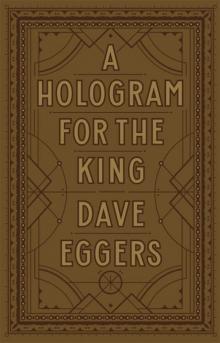 A Hologram for the King
A Hologram for the King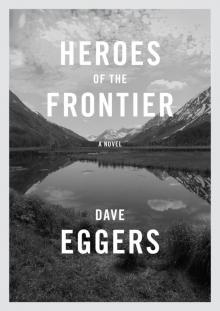 Heroes of the Frontier
Heroes of the Frontier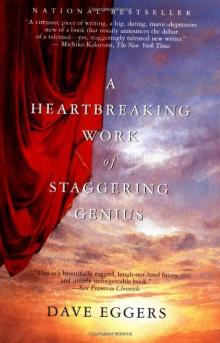 A Heartbreaking Work of Staggering Genius
A Heartbreaking Work of Staggering Genius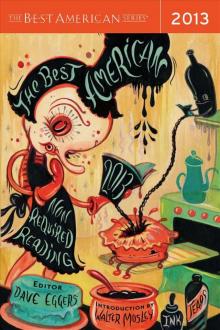 The Best American Nonrequired Reading 2013
The Best American Nonrequired Reading 2013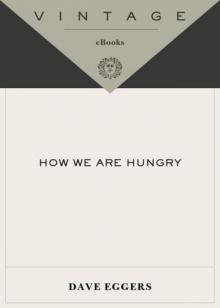 How We Are Hungry
How We Are Hungry The Circle
The Circle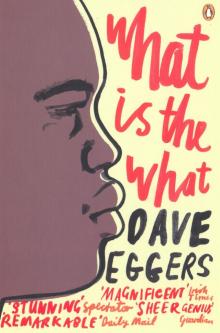 What is the What
What is the What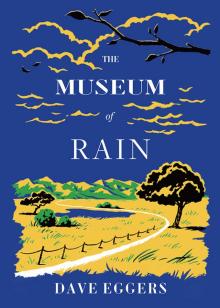 The Museum of Rain
The Museum of Rain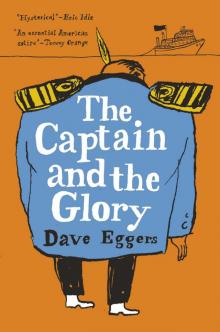 The Captain and the Glory
The Captain and the Glory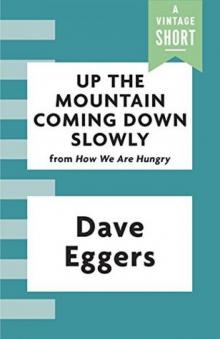 Up the Mountain Coming Down Slowly
Up the Mountain Coming Down Slowly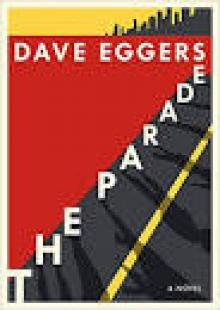 The Parade
The Parade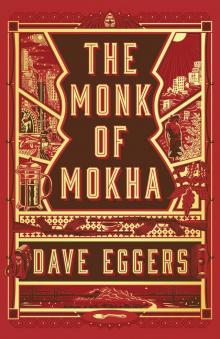 The Monk of Mokha
The Monk of Mokha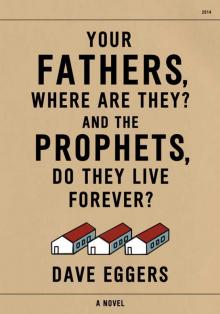 Your Fathers, Where Are They? And the Prophets, Do They Live Forever?
Your Fathers, Where Are They? And the Prophets, Do They Live Forever? You Shall Know Our Velocity
You Shall Know Our Velocity The Wild Things
The Wild Things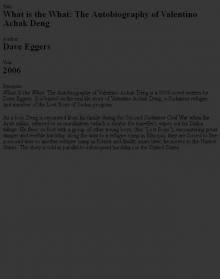 2006 - What is the What
2006 - What is the What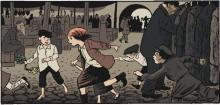 The Best American Nonrequired Reading 2011
The Best American Nonrequired Reading 2011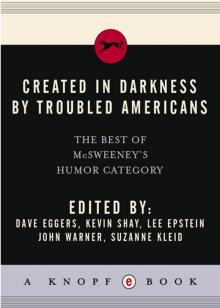 Created in Darkness by Troubled Americans
Created in Darkness by Troubled Americans